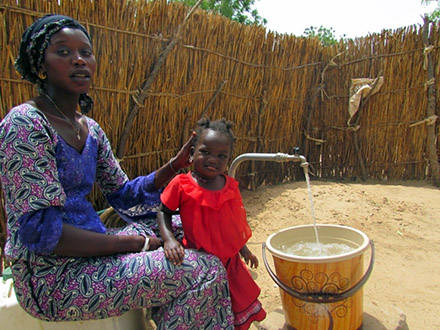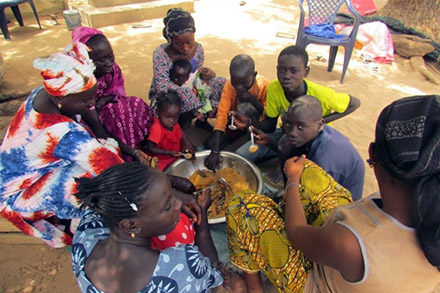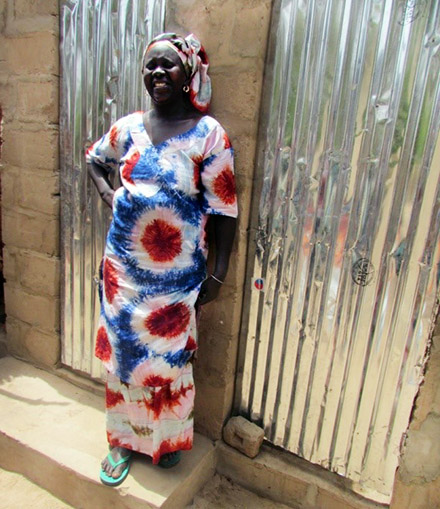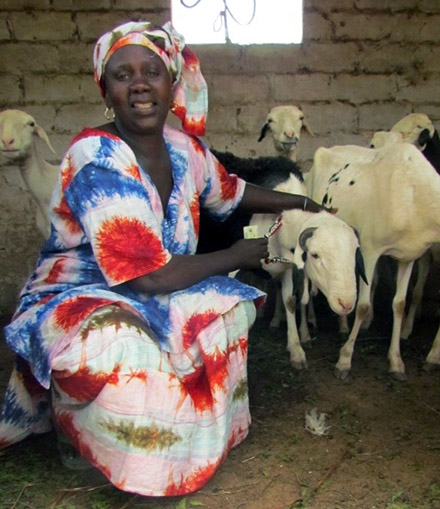
Gagnessiri Ndiaye has been smiling since she began working with Heifer Senegal’s sheep project.
“I am a happy woman with a job and a good house with an improved sanitation facility and a safe drinking water source. My family and I are able to eat what we want when we want it. We have improved our techniques of sheep rearing and have a flock of 12 in our pen,” Gagnessiri said.
Now 50 years old, she lives in Same Ndiaye Village with her husband Ousmane Faye their nine children, her daughter-in-law and her granddaughter.
Gagnessiri’s parents arrange her marriage when she was 15 years old. For the first three years of their marriage, she lived with her in-laws while her husband worked in a small shop in Thiers Town. When their first child was born, Ousmane spent all his savings on the naming ceremony.
“Then, we had to leave my husband’s family home to start one of our own,” Gagnessiri said. “We started our new life with only 4,000 FCFA (about $8) in Same Ndiaye.”

In Senegal, most rural families have at least two or three rooms in their homes, but Gagnessiri and her husband did not even have materials to build a home. Thanks to help from neighbors, they were able to build a one-room straw hut. Though the couple had more children, they still could not afford a larger house.
“Think of it, our hut was multi-use, we slept with our children and also our kitchen equipment,” Gagnessiri said.
While the family was away working on the farm in Magueye Ndiaye, their neighbor called to tell them their hut had fallen in the heavy rain.
“We would have spent the night in the open if it were not for the solidarity of neighbors who contributed resources to build our family a new hut.”
Most rural families in Senegal have fields they cultivate for their food; however, Gagnessiri’s family did not have fields of their own, so they farmed with their neighbor. At harvest, they would receive 220 pounds of millet, 110 pounds and 44 pounds peanut cowpea for their work, but it was not enough to supply their food for the year.
“August and September were very difficult for us. Sometimes I borrowed food from neighbors to feed my children; sometimes we ate once a day,” Gagnessiri said. “Throughout the village I was the first to harvest fresh, barely mature millet grains. My husband gardened during the dry season. The revenue from his harvest earned our family about $200 per year to live on.”

The family’s self-esteem was eroding fast. Without a toilet, they had no choice but to go into the bush to relieve themselves. They walked more than 200 yards to fetch water to drink or to use at home, which made it difficult to do laundry or to shower.
In light of expensive school fees, only four of Gagnessiri’s nine children attended school.
“During the Ramadan period, my children picked berries to sell so we could pay for the food to break the fast,” Gagnessiri said. “With all these difficulties, it was impossible to ensure the health of our children. My first child fell ill, but we did not have the financial means to provide health care.”
Three of Gagnessiri’s children died from the effects of malnutrition and poor sanitation.
Over time, Gagnessiri realized she could not solve all her problems alone. She joined a self-help group (SHG) with other women in her village, and Heifer began to assist Gagnessiri’s SHG with trainings in December 2011. Heifer selected 18 families, including Gagnessiri’s, to receive animals and improved seeds.
Gagnessiri completed improved animal husbandry training and built a modern pen before receiving three sheep.
“Every two hours I checked to see if the animals were still in the pen, reminding myself that I was not dreaming. It was the first time we had our own resources,” Gagnessiri said.
Help empower a family like Gagnessiri's with the gift of an animal in their pen.
With each training Gagnessiri’s confidence grew from that of a skill-less 15-year-old to that of a successful sheep farmer. From their three sheep, they have reared 27. Gagnessiri sold two rams for about $500 and was able to build two extra sleeping rooms for the children. In 2012, she sold a sheep for $120 and paid to connect water to their house. In the same year, she sold another sheep for $100 and built a modern ventilated pit latrine for the family.
“We no longer consider ourselves the poorest in the village,” Gagnessiri said.
All aspects of the family’s life have changed because of their participation in the Heifer project. They can afford new clothes at least three times a year and they eat nutritious, diverse meals. Three of their children are still in school: one in college and the other two in primary school.

“With the proceeds from the sale of two sheep, I could pay for a solar panel that would allow us to illuminate our house," Gagnessiri said.
She said Heifer’s micro-entrepreneurship training has had a lasting impact on her and her family.
“I realized I could be more entrepreneurial despite my lack of formal education,” Gagnessiri said. “The training I received from Heifer opened my mind, and I was able to find work with a company that exports fruit.”
Gagnessiri has worked for the company since October 2014 and earns about $5 a day.
Heifer’s 12 Cornerstones for Just and Sustainable Development greatly influenced the family. Gagnessiri has become a model in her village. Less than 18 months after receiving the sheep, she passed on two sheep to Awa Kane and one to Dior Diene and offered a ram to Gora Ndiaye during Tabaski celebrations (Senegal’s largest holiday).
“I have helped build the capacity of nine people in our village on livestock management. Five of them have built their animal pens and started sheep rearing,” Gagnessiri said. “I am a woman among women, and my family is well respected in the village.”
Story and photos by Christopher Tifuntoh, Monitoring, Evaluation and Communication Officer, Heifer Senegal